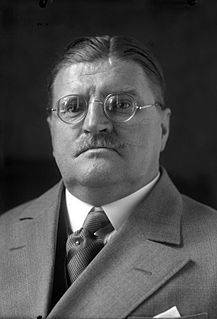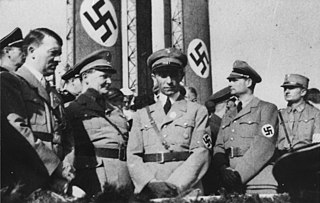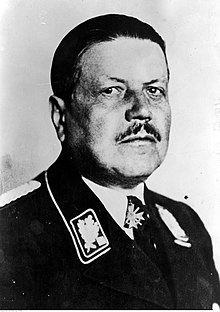
Wilhelm Frick was a prominent German politician of the Nazi Party (NSDAP), who served as Reich Minister of the Interior in Adolf Hitler's cabinet from 1933 to 1943 and as the last governor of the Protectorate of Bohemia and Moravia.

Walther Funk was a German economist and Nazi official who served as Reich Minister for Economic Affairs from 1938 to 1945 and was tried and convicted as a major war criminal by the International Military Tribunal at Nuremberg. Sentenced to life in prison, he remained incarcerated until he was released on health grounds in 1957. He died three years later.

Konstantin Hermann Karl Freiherr von Neurath was a German diplomat who served as Foreign Minister of Germany between 1932 and 1938.

The House of Eltz is a noted German noble family of the Uradel. The Rhenish dynasty has had close ties to the Kingdom of Croatia-Slavonia since 1736.

The Hitler cabinet was the government of Nazi Germany between 30 January 1933 and 30 April 1945 upon the appointment of Adolf Hitler as Chancellor of the German Reich by president Paul von Hindenburg. It was originally contrived by the national conservative politician Franz von Papen, who reserved the office of the Vice-Chancellor for himself. Originally, Hitler's first cabinet was called the Reich Cabinet of National Salvation, which was a coalition of the Nazi Party (NSDAP) and the national conservative German National People's Party (DNVP).
Reichspost was the name of the postal service of Germany from 1866 to 1945.

Herbert Friedrich Wilhelm Backe was a German politician and SS Senior group leader (SS-Obergruppenführer) in Nazi Germany who served as State Secretary and Minister in the Reich Ministry of Food and Agriculture. He was a doctrinaire racial ideologue, a long-time associate of Richard Walther Darré and a personal friend of Reinhard Heydrich. He developed and implemented the Operation hunger that envisioned death by starvation of millions of Slavic and Jewish "useless eaters" following Operation Barbarossa, the 1941 invasion of the Soviet Union.

Otto Lebrecht Eduard Daniel Meissner was head of the Office of the President of Germany from 1920 to 1945 during nearly the entire period of the Weimar Republic under Friedrich Ebert and Paul von Hindenburg and, finally, under the Nazi government under Adolf Hitler.

Hans-Erich Voss was a German Vizeadmiral and one of the final occupants of the Führerbunker during the battle of Berlin in 1945. He was also among the last people to see both Adolf Hitler and Joseph Goebbels alive before they committed suicide.

Peter Paul Freiherr von Eltz-Rübenach was Reich Postal Minister (Reichspostminister) and Reich Minister of Transport (Reichsminister für Verkehr) of Germany between 1932 and 1937.

The Government of Nazi Germany was a dictatorship run according to the Führerprinzip. As the successor to the government of the Weimar Republic, it inherited the government structure and institutions of the previous state. Although the Weimar Constitution technically remained in effect until Germany's surrender in 1945, there were no actual restraints on the exercise of state power. In addition to the already extant government of the Weimar Republic, the Nazi leadership created a large number of different organizations for the purpose of helping them govern and remain in power. They rearmed and strengthened the military, set up an extensive state security apparatus and created their own personal party army, which in 1940 became known as the Waffen-SS.

The Reich Postal Ministry in Berlin was the Ministry in charge of the Mail and the Telecommunications of the German Weimar Republic from 1919 until 1933 as well as of Nazi Germany from 1933 to 1945. After the Second World War, the Federal Ministry for Post and Telecommunications in West Germany and the Ministry for Post and Telecommunications in East Germany took over the postal system in their respective nations.

Julius Heinrich Dorpmueller was general manager of Deutsche Reichsbahn-Gesellschaft from 1926 to 1945, a Nazi politician and the Reich Minister for Transport from 1937 to 1945.

This is a survey of the postage stamps and postal history of Germany and philatelically related areas. The main modern providers of service were the Reichspost (1871–1945), the Deutsche Post under Allied control (1945–1949), the Deutsche Post of the GDR (1949–1990), the Deutsche Bundespost (1949–1995), along with the Deutsche Bundespost Berlin (1949–1990), and are now the Deutsche Post AG.
Deutschland erwacht is a 1933 German Nazi propaganda film.

Kaiser Wilhelm II abdicated as German Emperor and King of Prussia in November 1918. The abdication was announced on 9 November by Prince Maximilian of Baden and was formally enacted by Wilhelm's written statement on 28 November, made while in exile in Amerongen, the Netherlands. This ended the House of Hohenzollern's 500-year rule over Prussia and its predecessor state, Brandenburg. Wilhelm ruled Germany and Prussia from 15 June 1888 through 9 November 1918, when he went into exile. Following the abdication statement and German Revolution of 1918–19, the German nobility as a legally defined class was abolished. On promulgation of the Weimar Constitution on 11 August 1919, all Germans were declared equal before the law. Ruling princes of the constituent states of Germany also had to give up their monarchical titles and domains, of which there were 22. Of these princely heads of state, four held the title of king (König), six held the title of grand duke (Großherzog), five held the title of duke (Herzog), and seven held the title prince.
Postschutz, after 1942 SS-Postschutz, was a paramilitary unit of Reichspost with a mission to protect post office installations from armed attacks.

The Reich Ministry of Transport was a cabinet-level agency of the German government from 1919 until 1945, operating during the Weimar Republic and Nazi Germany. Formed from the Prussian Ministry of Public Works after the end of World War I, the RVM was in charge of regulating German railways, roadways, waterways, and the construction industry - a kind of infrastructure agency in today's understanding. In the 1920s, the Ministry's involvement in the rail sector was limited to administrative and technical supervisory functions. The National Railway was initially organized as an independent state-owned company to guarantee that Germany paid war reparations according to the provisions of the 1924 Dawes Plan.

Kuno Heinrich Franziskus Maria Hubertus Reichsfreiherr und Edler Herr von und zu Eltz-Rübenach was a member of the Reichstag of Nazi Germany and a SS-Brigadeführer.
















